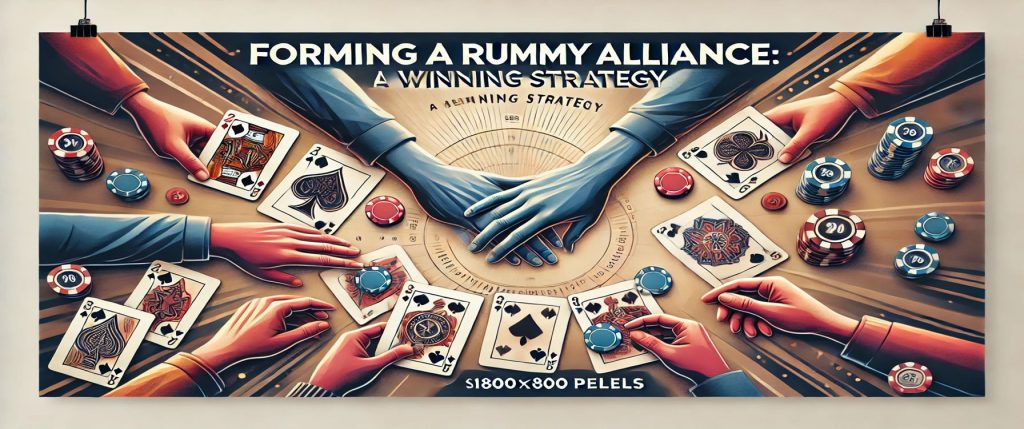
An All-Inclusive Guide to the Rummy Alliance The idea behind a Rummy Alliance is based on the strategic gameplay of rummy, a card game that prioritizes social interaction, skill, and strategy. In order to increase their chances of winning, rummy players frequently band together, exchanging resources & information to outwit rivals. This partnership is dynamic and necessitates mutual understanding, collaboration, and a common goal; it is not just a short-term arrangement. Gamers need to understand how crucial teamwork is because it can have a big impact on how the game turns out. Alliance members can put up a strong front against other players by combining their knowledge and abilities, so it’s critical to understand the subtleties of this cooperative strategy.
Also, comprehending the Rummy Alliance necessitates being aware of the psychological components of gameplay. Because alliances can change quickly depending on how the game is playing out, players must strike a careful balance between cooperation & competition. Without trust, players might be reluctant to share important information or resources, making it the foundation of any successful alliance. Rummy’s structure also permits strategic deception, in which players may pretend to be allies or alter perceptions in order to obtain an advantage. Understanding the Rummy Alliance thus necessitates not only an understanding of the game’s mechanics but also a cognizance of interpersonal dynamics and strategic thinking.
A vital first step in creating a successful rummy alliance is locating possible alliance partners. Players should seek out people with complementary play styles & skill sets. A player who is particularly good at counting cards and strategizing, for example, might find it helpful to partner with someone who has good people skills & can read opponents well.
This collaboration can produce a cohesive team that can handle a range of difficulties that arise during gameplay. Also, players should think about the personalities of possible partners; people who are gregarious and willing to work together are frequently better allies than those who would rather play alone. Finding possible partners also involves evaluating their degree of experience & dedication to the game. It is more probable that players will benefit the alliance if they are equally committed to honing their craft & comprehending the nuances of rummy.
Potential partners can also benefit from watching how they interact with other players while playing; those who show respect for other players and sportsmanship can create a more positive alliance environment. In the end, an alliance with people who have similar objectives and principles can result in a more unified and successful collaboration. Establishing trust is essential to the success of a rummy alliance. Transparency and regular communication between alliance members foster trust.
It is important for players to have candid conversations about their tactics, advantages, and disadvantages in order to foster an environment where everyone feels heard and respected. Frequent check-ins can support the development of this trust by enabling participants to discuss their gameplay experiences and any potential strategy adjustments. Through cultivating an atmosphere of integrity and encouragement, athletes can improve their relationships and teamwork. Effective communication goes beyond spoken interactions as well; during gameplay, nonverbal clues are crucial for expressing intentions & feelings. Players should pay attention to each other’s reactions & body language since these can reveal important details about their partners’ emotions & thoughts.
Having open lines of communication, whether via direct dialogue or coded signals while playing, can also facilitate alliance decision-making. Alliance members can more successfully negotiate obstacles and present a unified front against adversaries by placing a higher priority on communication and trust. Any successful Rummy Alliance must have a cohesive strategy since it offers a clear path for cooperation while playing. Alliance members must first evaluate their unique strengths & weaknesses in order to determine how to use them to further shared objectives.
Frequently, this process entails brainstorming meetings where participants can exchange concepts and suggest strategies that complement their group’s goals. Through cooperative dialogue, participants can develop a plan that takes advantage of their special skills and addresses any weaknesses. Also, adaptability is essential when creating a cohesive plan. Because of the dynamic nature of rummy, alliance members need to be ready to modify their plans for any given situation. This flexibility necessitates constant communication and a readiness to revise plans in light of fresh data or changes in the dynamics of the game.
Alliances can stay flexible and responsive to obstacles by creating an atmosphere where members feel free to express concerns or suggest changes. In the end, a clear but flexible plan will enable alliance members to cooperate for success. Leveraging individual strengths for group success is one of the biggest benefits of establishing a rummy alliance.
Every player has different abilities; some may be very good at counting cards, while others may be skilled at bluffing or psychological tricks. By identifying these advantages, alliance members can assign responsibilities according to specialization, guaranteeing that every member makes a valuable contribution to the group’s overall plan. A player with great analytical abilities, for example, might be in charge of monitoring opponents’ movements, while a player with superior social skills might concentrate on establishing rapport with other players in order to obtain intelligence.
Members of the alliance must help each other improve their abilities in addition to allocating responsibilities according to individual strengths. Sharing strategies & advice that have worked well in previous games or offering helpful criticism during practice sessions could be two examples of this. Alliances can improve their overall performance and fortify member relationships by cultivating an atmosphere of mutual growth and development. Using individual strengths ultimately improves the gaming experience for all participants while also increasing the alliance’s chances of success. Comprehending Disagreements in Cooperative Activities.
Any cooperative endeavor, including Rummy Alliances, will inevitably involve conflict. Conflicts may emerge over tactics, the distribution of resources, or even member relationships. Maintaining harmony within the alliance and making sure it stays focused on its objectives depend on how well these disputes are managed.
establishing guidelines for resolving disputes. Establishing ground rules for conflict resolution at the beginning of the alliance formation process is one successful strategy. These guidelines ought to support respectful discourse and tolerance for dissenting views.
Alliance members can address concerns before they become more serious by establishing a safe forum for dialogue. Demonstrating empathy and active listening. Members of the alliance should also engage in active listening when disagreements arise. This entails listening to what people have to say as well as making an effort to completely comprehend their viewpoints. Alliances can promote empathy and cooperation in trying circumstances by recognizing the thoughts and feelings of each member.
settling disputes and fortifying the partnership. Also, fostering unity within the alliance and resolving conflicts can be achieved by reaching a consensus or compromising. In the end, good conflict resolution will improve the alliance’s overall resilience and fortify bonds within it. Any Rummy Alliance hoping for long-term success must be able to change and grow. Alliances must be prepared to reevaluate their own strategies in light of emerging opponents’ tactics as the game progresses.
This flexibility necessitates constant assessment of internal dynamics as well as external gameplay-influencing elements. Members can talk about what has been effective and what needs to be improved at regular strategy meetings, which can help to speed up this process. Alliances can adapt to changing conditions by creating an atmosphere where criticism is valued and welcomed. Adding fresh methods or strategies that players have picked up from other games or experiences may also be a part of changing the alliance strategy. Keeping up with new developments in rummy play can yield insightful information that improves the alliance’s efficacy. Also, alliances should be willing to try out various tactics in less competitive games or during practice sessions; this method of trial & error can result in creative strategies that provide them with an advantage over rivals in subsequent games.
In the end, alliances that embrace flexibility will be better equipped to overcome obstacles & keep getting better. In a rummy alliance, acknowledging accomplishments is essential to preserving spirits and strengthening team spirit. By recognizing accomplishments, no matter how minor, members can feel more accomplished and inspired to keep aiming for greatness. From unofficial get-togethers following a successful game to more formal recognition events that highlight individual contributions, celebrations can take many different forms. Alliances can fortify their ties and make enduring memories that foster their spirit of cooperation by taking the time to collectively reflect on their successes. Alliances must continue to build momentum by establishing new objectives & challenges in addition to acknowledging accomplishments.
This proactive strategy promotes ongoing development while avoiding complacency following successes. By reviewing goals on a regular basis, alliances can remain committed to their long-term goals while simultaneously adjusting to shifting player capabilities or gameplay dynamics. Rummy Alliances are able to maintain their success over time while taking pleasure in the journey together by cultivating an atmosphere of celebration and continuous improvement.
In summary, creating a successful Rummy Alliance requires knowing its dynamics, finding compatible partners, communicating to establish trust, creating cohesive strategies, utilizing individual strengths, effectively resolving conflicts, modifying plans as necessary, and acknowledging accomplishments along the way. Players can improve their gaming experience and raise their winning odds in this captivating card game by adhering to these guidelines.




